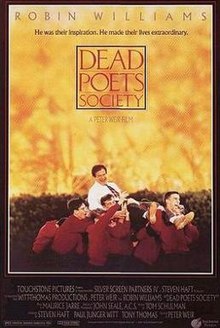 Based on scriptwriter, Tom Schulman’s life at the Montgomery
Bell Academy in Nashville, Dead Poets
Society was released in June 1989. Starring Robin Williams, Robert Sean
Leonard, Ethan Hawke, Josh Charles, Gale Hansen, Norman Lloyd and Kurtwood
Smith, it grossed over $230 million and won the award for Best Original
Screenplay. Williams was also nominated for Best Actor, Director Peter Weir was
nominated for Best Director and the film was nominated for Best Picture, but
lost to Driving Miss Daisy.
Based on scriptwriter, Tom Schulman’s life at the Montgomery
Bell Academy in Nashville, Dead Poets
Society was released in June 1989. Starring Robin Williams, Robert Sean
Leonard, Ethan Hawke, Josh Charles, Gale Hansen, Norman Lloyd and Kurtwood
Smith, it grossed over $230 million and won the award for Best Original
Screenplay. Williams was also nominated for Best Actor, Director Peter Weir was
nominated for Best Director and the film was nominated for Best Picture, but
lost to Driving Miss Daisy.
In 1959, Welton Academy hired John Keating (Williams) as the
new English teacher for the upcoming school year. Inspiring his students to go
against the flow and be themselves, he makes poetry cool and rebellious. A
group of his students (Leonard, Hawke, Charles, Hansen, James Waterston and
Allelon Ruggiero) also form a group called the Dead Poets Society, sneaking out
at night to read poetry in a secluded cave.
I’ll never forget the first time I saw this film, in the
middle of my sophomore year high school English class at the beginning of a
unit on poetry. I enjoyed it back then and I always watch at least some of it
when I come across it on TV. Dead Poets
Society is one of Williams’ best acted films with him alongside a great
cast, incredible writing and good cinematography.
Ebert said Williams spoiled the film by occasionally veering
into his comedic persona. He failed to understand the character. While Keating
did have his comedic moments, they diverted from his mostly serious and
instructive persona. In other words, Williams made him into a normal person who
liked to insert a little humor into a serious lesson. Furthermore, the moments
where he’s seriously teaching completely overshadow those comedic moments,
especially during the whole improvised poetry scene with one of his students
calling Walt Whitman a “sweaty-toothed madman.”
The above scene might also be one of the best scenes in the
entire film in regards to the writing and cinematography as well. The lines
from the improvised poem and the spinning camera do really well in cementing
the scene as a lesson Keating gives the student in really seizing the moment
and living out his first lesson of carpe diem. The final shot is also perfect, with
the students standing in solidarity on their desks. It shows that Keating’s
lesson of seeing the world differently, being themselves and going against the
flow did get through to them and that they will act it out.
That brings forth the message of the film, which, yes, it’s
blatant and whacks the viewer upside the head. But it’s one of those films that’s
so well made, the viewer doesn’t care they were just assaulted with a heavy
idea.
Dead Poets Society
is a great film and definitely one of Williams’ best.
No comments:
Post a Comment